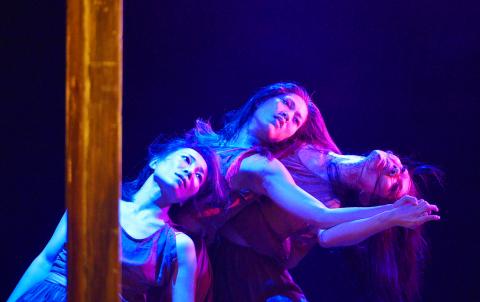The 12th Tsai Jui-yueh International Dance Festival (第十二屆蔡瑞月國際舞蹈節), which opens tonight at the Rose Historic Site (玫瑰古蹟), will pay tribute to democracy activist Deng Nan-jung (鄭南榕) as well as commemorate the 70th anniversary of the 228 Incident.
US choreographer Eleo Pomar’s 2004 work Tableaux was inspired by the life and death of Deng, publisher of Freedom Era Weekly magazine, who set himself on fire in 1989 after barricading himself in his Taipei office for more than 70 days to avoid arrest and trial for publishing the “Taiwan Republic constitution.”
The Rose Historic Site, a rebuilt Japanese-style house, served for decades as the dance studio for Taiwanese modern dance pioneer and political activist Tsai Jui-yueh (蔡瑞月). For the festival, the building’s sliding front doors are pushed back so the front room can serve as a stage, while the audience is seated in the garden outside.

Photo: Sam Yeh, AFP
Pomar’s works have often been performed at the festival, organized by Tsai’s daughter-in-law Ondine Hsiao (蕭渥廷), chair of the Tsai Jui-yueh Culture Foundation. Hsiao asked Pomare to create a work after seeing one of his pieces in Australia in 2002.
In addition to one of Tsai’s works, Kite (風箏), some of the other works on the program are by names familiar to those who have seen previous festivals, including Ishii Baku, who was one of Tsai’s teachers when she studied in Japan, and Australian Elizabeth Dalman. There will also be works by US choreographer Joan Miller and upcoming Taiwanese choreographer Wen Zhu-wei (溫祖威).
■ Tonight, tomorrow and Sunday at 7:45pm, tomorrow and Sunday at 3pm at the Rose Historic Site (玫瑰古蹟), via Lane 46, Zongshan N Rd Sec 2 (台北市中山北路二段46巷進場)
■ Tickets are NT$1,000, available through NTCH box offices, Eslite ticket desks, online at www.artstickets.com.tw and convenience store kiosks

The canonical shot of an East Asian city is a night skyline studded with towering apartment and office buildings, bright with neon and plastic signage, a landscape of energy and modernity. Another classic image is the same city seen from above, in which identical apartment towers march across the city, spilling out over nearby geography, like stylized soldiers colonizing new territory in a board game. Densely populated dynamic conurbations of money, technological innovation and convenience, it is hard to see the cities of East Asia as what they truly are: necropolises. Why is this? The East Asian development model, with

This is a deeply unsettling period in Taiwan. Uncertainties are everywhere while everyone waits for a small army of other shoes to drop on nearly every front. During challenging times, interesting political changes can happen, yet all three major political parties are beset with scandals, strife and self-inflicted wounds. As the ruling party, the Democratic Progressive Party (DPP) is held accountable for not only the challenges to the party, but also the nation. Taiwan is geopolitically and economically under threat. Domestically, the administration is under siege by the opposition-controlled legislature and growing discontent with what opponents characterize as arrogant, autocratic

June 16 to June 22 The following flyer appeared on the streets of Hsinchu on June 12, 1895: “Taipei has already fallen to the Japanese barbarians, who have brought great misery to our land and people. We heard that the Japanese occupiers will tax our gardens, our houses, our bodies, and even our chickens, dogs, cows and pigs. They wear their hair wild, carve their teeth, tattoo their foreheads, wear strange clothes and speak a strange language. How can we be ruled by such people?” Posted by civilian militia leader Wu Tang-hsing (吳湯興), it was a call to arms to retake

When Lisa, 20, laces into her ultra-high heels for her shift at a strip club in Ukraine’s Kharkiv, she knows that aside from dancing, she will have to comfort traumatized soldiers. Since Russia’s 2022 invasion, exhausted troops are the main clientele of the Flash Dancers club in the center of the northeastern city, just 20 kilometers from Russian forces. For some customers, it provides an “escape” from the war, said Valerya Zavatska — a 25-year-old law graduate who runs the club with her mother, an ex-dancer. But many are not there just for the show. They “want to talk about what hurts,” she